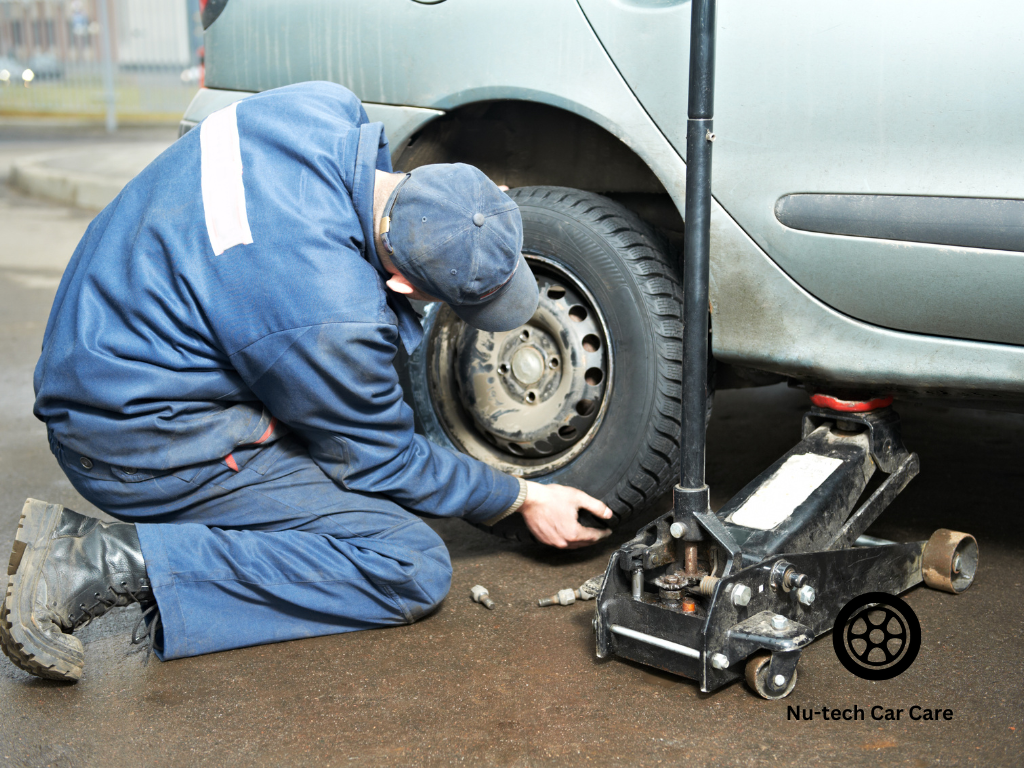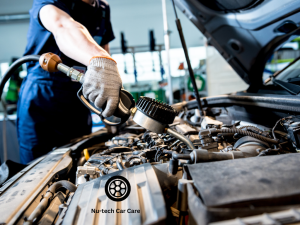Vehicle scanning is a process that involves using specialized diagnostic tools to check and analyze various systems within a vehicle. These tools connect to the car’s onboard computer system, retrieving data and identifying any issues or irregularities. The information gathered from vehicle scanning includes engine performance, emissions levels, fuel efficiency, and other critical metrics. This technology is essential for maintaining the health of modern vehicles, as it allows for precise detection and troubleshooting of potential problems before they escalate.
Importance of Preventive Maintenance
Preventive car maintenance refers to the regular servicing and inspection of a vehicle to prevent potential problems and extend its lifespan. This proactive approach helps ensure that all parts of the vehicle function optimally, reducing the risk of unexpected breakdowns and costly repairs. Incorporating vehicle scanning into preventive maintenance routines allows for early detection of issues, providing car owners with the opportunity to address problems promptly. Regular maintenance not only improves safety and reliability but also enhances the overall performance and efficiency of the vehicle.
Scheduling Regular Vehicle Scans

Recommended Frequency for Vehicle Scanning
To maintain optimal vehicle performance and prevent major issues, it is recommended to schedule vehicle scans at regular intervals. Generally, a comprehensive vehicle scan should be conducted at least once a year, or every 12,000 miles, whichever comes first. However, for those who frequently drive long distances or use their vehicles under harsh conditions, more frequent scans might be necessary. Additionally, it is advisable to perform a vehicle scan before long trips or after experiencing any unusual symptoms, such as warning lights or changes in driving behavior.
Benefits of Consistent Monitoring
Consistent monitoring through regular vehicle scanning offers several benefits:
- Early Detection of Issues: Regular scans help identify potential problems early, allowing for timely repairs and preventing minor issues from becoming major repairs.
- Improved Performance: By addressing issues promptly, vehicle scanning ensures that the car runs smoothly and efficiently.
- Enhanced Safety: Detecting and fixing problems early reduces the risk of breakdowns and accidents, ensuring a safer driving experience.
- Cost Savings: Preventive maintenance, aided by vehicle scanning, can save money by avoiding expensive repairs and extending the life of the vehicle.
Using Scan Results for Maintenance Planning
Interpreting Vehicle Scanning Data
Interpreting the data retrieved from vehicle scans is crucial for effective maintenance planning. Vehicle scanners provide detailed information about various components and systems, including error codes and performance metrics. Understanding these codes and metrics helps identify specific issues and their severity. For example, error codes related to the engine, transmission, or emissions system indicate areas that require immediate attention. Vehicle owners or technicians can use this information to prioritize repairs and maintenance tasks, ensuring that critical issues are addressed promptly.
Creating a Maintenance Schedule Based on Scan Results
Once the vehicle scanning data has been interpreted, it can be used to create a comprehensive maintenance schedule. This schedule should include both immediate repairs and routine maintenance tasks, such as oil changes, filter replacements, and tyre rotations. By following a maintenance schedule based on scan results, vehicle owners can ensure that their car remains in optimal condition. Additionally, integrating tyre tech data, which monitors tyre health and performance, into the maintenance schedule can further enhance vehicle safety and efficiency. Regularly updating the maintenance schedule based on new scan results ensures ongoing vehicle health and performance.
Preventing Major Breakdowns with Early Detection

Identifying Potential Issues Before They Escalate
One of the primary benefits of vehicle scanning is its ability to identify potential issues before they escalate into major problems. The detailed diagnostic data provided by vehicle scanners allows technicians to detect early signs of wear and tear, component malfunctions, or other anomalies. For instance, a slight decrease in fuel efficiency or unusual engine noise detected during a scan can indicate underlying issues that, if left unaddressed, could lead to significant damage and costly repairs. By catching these issues early, vehicle owners can take proactive steps to resolve them, ensuring the continued reliability and performance of their vehicle.
Reducing Repair Costs through Early Intervention
Addressing issues early through regular vehicle scanning and preventive maintenance can significantly reduce repair costs. Small problems, such as a minor leak or worn-out part, can often be fixed quickly and inexpensively if detected early. However, if these issues are ignored, they can lead to more severe damage that requires extensive and costly repairs. For example, a small coolant leak, if left unchecked, could lead to engine overheating and eventual engine failure. By using vehicle scanning to catch such issues early, vehicle owners can avoid these costly repairs and maintain their vehicle in top condition.
Enhancing Vehicle Performance and Longevity
Optimizing Engine Performance with Regular Scans
Regular vehicle scanning plays a crucial role in optimizing engine performance. By routinely analyzing the engine’s health, vehicle scanning can detect issues such as inefficient fuel combustion, malfunctioning sensors, or clogged filters. Addressing these problems promptly ensures that the engine runs smoothly and efficiently. Key benefits include:
- Improved Fuel Efficiency: Detecting and fixing issues related to fuel injection and combustion can significantly improve fuel efficiency, saving money on fuel costs.
- Enhanced Power Output: Ensuring that all engine components are functioning correctly helps maintain optimal power output, providing a smoother and more responsive driving experience.
- Reduced Emissions: Proper engine tuning and maintenance reduce harmful emissions, contributing to a cleaner environment.
Extending Vehicle Lifespan through Preventive Measures
Preventive maintenance, facilitated by regular vehicle scanning, is essential for extending the lifespan of a vehicle. By identifying and addressing issues early, owners can prevent major breakdowns and prolong the life of critical components. Benefits include:
- Lower Repair Costs: Early detection and repair of minor issues prevent them from escalating into costly major repairs.
- Increased Reliability: Regular maintenance ensures that the vehicle remains reliable and less prone to unexpected breakdowns.
- Higher Resale Value: A well-maintained vehicle with a documented history of regular scans and maintenance commands a higher resale value.
Vehicle Scanning and Tyre Tech Integration

Monitoring Tyre Health and Performance
Integrating vehicle scanning with tyre tech provides a comprehensive approach to vehicle maintenance. Tyre tech involves using sensors and diagnostic tools to monitor tyre health and performance, including:
- Tread Depth and Wear: Regular monitoring of tread depth helps ensure tyres maintain adequate grip and safety.
- Tyre Pressure: Maintaining proper tyre pressure is crucial for safety, fuel efficiency, and tyre longevity. Tyre tech sensors provide real-time pressure readings.
- Temperature Monitoring: Detecting abnormal tyre temperatures can indicate issues such as underinflation, overloading, or misalignment.
Utilizing Tyre Tech Data for Comprehensive Maintenance
Combining vehicle scanning data with tyre tech insights allows for a more holistic approach to maintenance. Benefits include:
- Preventing Tyre Failures: Early detection of tyre issues helps prevent blowouts and other tyre-related failures.
- Optimizing Tyre Lifespan: Regular monitoring and maintenance based on tyre tech data extend the life of tyres, saving money on replacements.
- Enhancing Safety: Comprehensive monitoring ensures that tyres are in optimal condition, improving overall vehicle safety and performance.
Choosing the Right Vehicle Scanning Tools
Key Features to Look for in a Vehicle Scanner
Selecting the right vehicle scanner is crucial for effective maintenance. Important features to consider include:
- Compatibility: Ensure the scanner is compatible with your vehicle’s make and model.
- Comprehensive Diagnostics: Look for scanners that provide detailed diagnostics for a wide range of vehicle systems.
- User-Friendly Interface: A scanner with an intuitive interface makes it easier to interpret data and perform diagnostics.
- Real-Time Data: Choose a scanner that provides real-time data and alerts for immediate action.
Compatibility with Tyre Tech Systems
When integrating vehicle scanning with tyre tech, compatibility is key. Consider the following:
- Integrated Solutions: Some vehicle scanners come with built-in tyre tech capabilities, providing a seamless integration.
- Data Syncing: Ensure that the vehicle scanner can sync data with tyre tech systems for comprehensive monitoring.
- Support and Updates: Choose a scanner from a reputable brand that offers regular updates and support for both vehicle diagnostics and tyre tech integration.
Conclusion

Recap of the Benefits of Vehicle Scanning in Preventive Maintenance
Regular vehicle scanning is a vital component of preventive maintenance, offering numerous benefits such as:
- Early Detection of Issues: Identifying problems before they escalate prevents major breakdowns.
- Cost Savings: Addressing minor issues early reduces the need for costly repairs.
- Enhanced Performance: Maintaining optimal engine performance and tyre health ensures a smoother and more efficient driving experience.
- Extended Vehicle Lifespan: Proactive maintenance extends the life of critical components and the vehicle overall.
Encouragement to Implement Regular Scanning Practices
Implementing regular vehicle scanning practices is essential for maintaining vehicle health and performance. By integrating vehicle scanning with tyre tech, owners can ensure comprehensive monitoring and maintenance, leading to safer, more reliable, and longer-lasting vehicles. Make vehicle scanning a regular part of your maintenance routine to enjoy these benefits and keep your vehicle running at its best.










